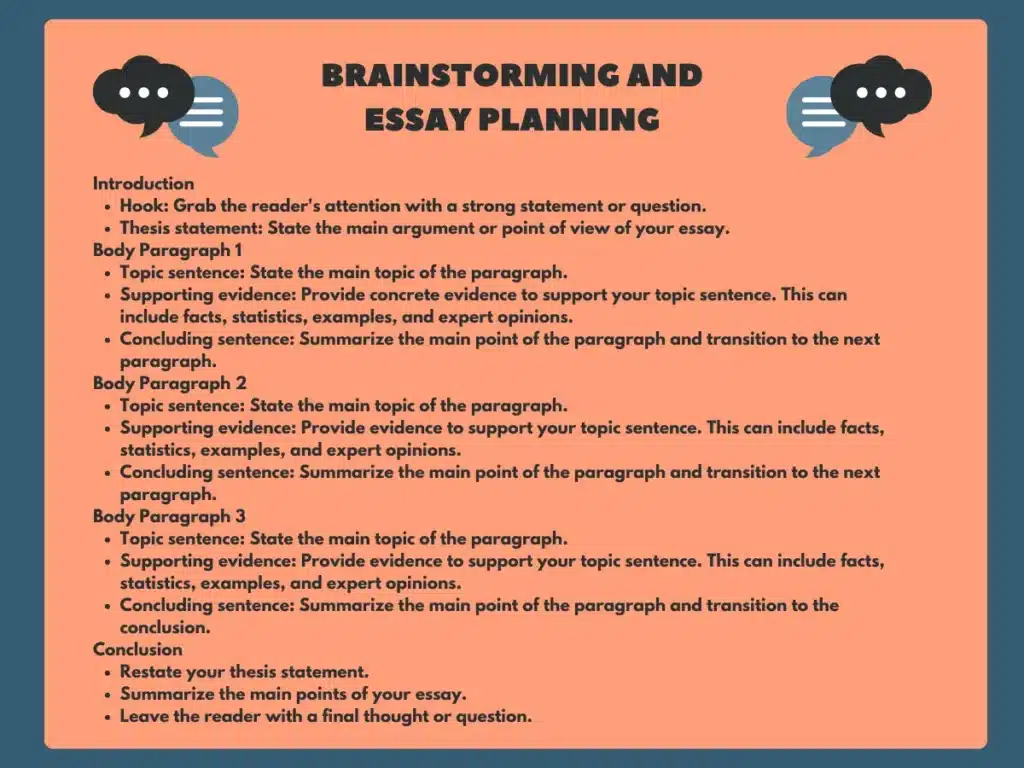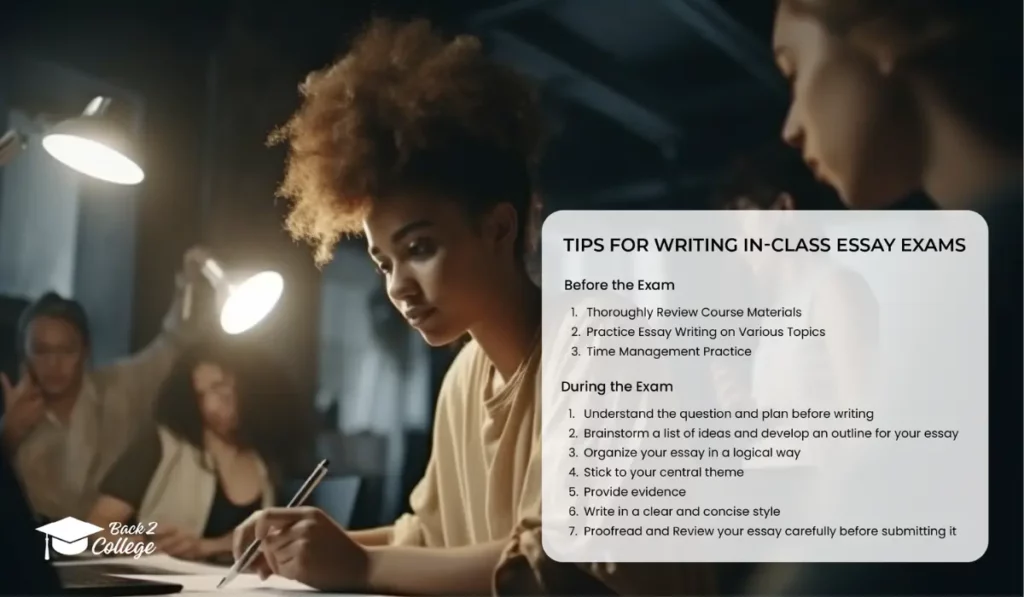9 Tips to Ace That Timed Essay
Exams are almost upon us, and a familiar sense of foreboding has settled over the campus. One exam element that can be particularly intimidating for some students is the timed essay: an exam question which demands a full essay on a topic that is typically revealed for the first time during the test. While these kinds of questions may seem scary, there are plenty of ways to make them easy for yourself. Read on for tips about how to prepare in advance of the exam and how to approach timed essays before, during, and after the writing process.
While Preparing for the Exam: Become familiar with the course content. If the professor hasn’t told you in advance what a timed essay prompt will be, it can be intimidating to think that you will have to write about a subject you’ve never seen before. However, this thinking process does not reflect the reality of the situation. In fact, even if your teacher hasn’t given you any hints about the essay question, you do know what it will be about: the concepts and ideas you’ve discussed in the course. Therefore, if you take the time to review your notes and ensure you understand everything that was discussed, it should be difficult for the essay question to catch you off guard. As soon as you read the question, relevant course concepts will start popping into your head, and you’ll just have to organize them into a coherent essay. Start planning if you can. Although the situation described above sometimes occurs, it’s also very common for professors to give their students a fairly detailed idea of what an essay question will involve in advance of the test day. (After all, professors want to mark high-quality essays written by well-prepared students!) This heads-up gives you a great chance to prepare for the exam. If you have the time, consider mapping out a possible essay in point form before the day of the exam arrives. Consider practicing writing under time pressure. You’ve probably written dozens of essays before--the only thing that sets a timed essay apart is that it’s timed. Students often struggle to complete the full essay within the time constraints, particularly if they have to write longhand when they’re accustomed to working on the computer. For this reason, it can be helpful to simulate the conditions of a timed exam before the actual day: pick a practice question, find some lined paper, set a stopwatch, and see how you do! Before You Start Writing: Read the question carefully. The most critical part of the essay-writing process actually happens before you write your first word. When you flip to the essay question, make sure you read it as carefully as you can, noting the difference between words such as ‘contrast’ and ‘analyze’ and highlighting any details which the professor specifically instructs you to include. It’s not uncommon for excellent essays to receive low marks because the student answered a question other than the one that was asked. Make a clear and specific plan. Some students react to the time pressure of essay exams by scribbling down their introduction as soon as they’ve read the question and figuring out their points as they go. While it might seem counter-intuitive, taking five or ten minutes before you start writing in order to draw up a plan will be an enormous time saver. Decide on your thesis, the topic of each paragraph, and the arguments which you intend to cover, then jot down some quick point-form notes. This process won’t take long, and, once you complete it, all that’s left will be to expand those notes into a well-organized essay. Without a clear plan, you run the risk of realizing partway through that you’ve drifted off topic or written yourself into a corner, and fixing these mistakes will consume a ton of extra time. Schedule a set time for each paragraph. On the topic of planning, it’s important to sketch out an idea of how long you want to spend on each section of your essay. (If you know the number of paragraphs you’ll need to write ahead of time, you can do this before the exam even starts!) Take note of the amount of time allotted for the exam and split it into reasonably-sized segments, leaving some time at the end for revision if possible. Without a schedule to follow, it’s easy to become too focused on a single paragraph and run out of time to finish the essay. While You’re Writing: Write clearly and double-space. This tip may seem basic, but it’s easy to forget and it can make a big difference. Both these measures won’t just make it easier for the marker to read your paper; they'll also help you write it. If you have time left at the end of the exam for review, having the ability to skim quickly through your work and write revisions in blank spaces will be incredibly helpful.
Keep yourself on schedule. Remember the paragraph-based schedule we discussed above? It’ll be useless if you don’t do regular check-ins during the exam. Keep an eye on the clock to ensure you’re always on track. If you realize that you’re falling dangerously behind schedule, it might be necessary to cut some arguments or examples you planned to include. Although making these omissions can be painful, it’s better to leave out a few points from one section than to leave out an entire paragraph because you ran out of time. Don’t worry too much about editing and revision before you finish. When composing essays, many students stop and read over each paragraph once they finish it, making sure that it’s well-written and free of errors before advancing to the next one. This approach is entirely logical when there’s no time pressure involved, but it can actually work against you during an exam. Perfecting paragraphs is a time-consuming process, and, if you spend too much time editing before the essay is finished, you might have to rush through the last few sections or leave them out entirely. For this reason, it’s best to focus on producing a complete first draft before you worry about edits and revisions.
After You’ve Finished Writing: Re-read the question and ensure you’ve addressed all parts. The most important part of writing an essay exam is ensuring that you’re answering the question was posed. Even if you made sure you were interpreting everything correctly before you began, you may have forgotten to address a subquestion or integrate an example as you were writing. Before you submit, read the prompt again and make sure your completed essay matches up! Edit if you have time. If you have enough time left over, read your essay again and make corrections. When you’re working under time pressure, it’s easy to make grammar mistakes or produce hard-to-follow sentences; the final few minutes are your chance to clean up those errors. Unless if you finished way ahead of schedule, don’t worry about major revisions like reorganizing the structure of the essay--it’s better to hand in an essay with an imperfect structure than a paper that’s impossible to follow because you had to stop halfway through the revision process.
Remember to have the right perspective. Once you hand your exam to the professor, relax! It’s easy to work yourself up after an essay exam when you didn’t get the chance to read your work over or you feel like your arguments were weak. However, it’s important to keep in mind that your professor understands the circumstances under which the essay was written. They’re fully aware of the time pressure you were dealing with, and they will judge your work far differently than they would judge a typical essay with a deadline set weeks after the assignment date. If you did your best to write a complete, clear, and insightful essay within the time allotted, you should have nothing to worry about. Best of luck during the upcoming exam season!
Source: Quick Meme
- outlining ,
- preparation ,
- writing process

Tips for Writing In-Class Essay Exams: Ace Timed Essay Tests

In-class essay exams are significant in the college grading methodology. These exams test your knowledge, understanding of study material, and ability to explain your knowledge in a specific duration. Doing well in these exams will improve your grades and overall academics. Students learn how to manage time and be precise in these time-bound tasks. These learnings will play a role in your future projects.
In-class essay exams are time-bound tasks, and you must finish them quickly and with quality to score good grades.
This article will present practical tips for writing in-class essay exams quickly and accurately. You will find actionable tips on how to prepare before the exam, practice answering, and manage your time to express the main point with specific evidence. Keep reading.
Writing a college essay involves several key steps. Start by understanding the essay prompt and brainstorming ideas. Create an outline to organize your thoughts and structure the essay logically. Craft a compelling introduction that grabs the reader’s attention, followed by body paragraphs that support your main points with evidence and examples. Ensure each paragraph flows coherently and relates back to the thesis statement. Conclude by summarizing your main arguments and reinforcing the essay’s significance. Finally, revise and edit for clarity, coherence, and grammar before submitting.
Before the Exam
Exam preparation is essential for success. By taking the time to prepare before the exam, you can increase your chances of doing well.
Here are three key tips for preparation before an in-class essay test:
1. Thoroughly Review Course Materials
Before the exam, make sure to carefully go through your course materials. This step is essential to become well-acquainted with the critical concepts and ideas that the exam might cover. Take the time to revisit your class notes, textbooks, and any relevant readings. This foundational knowledge will serve as the backbone for your essay responses.
2. Practice Essay Writing on Various Topics

To enhance your essay-writing skills, engage in practicing essays on a range of topics. This practice not only hones your ability to express ideas clearly but also helps you understand how to structure an essay effectively. Consider addressing diverse essay prompts and experimenting with different writing styles. This practice will make you more versatile in approaching essay questions during the exam.
3. Time Management Practice
Efficient time management is of utmost importance during an in-class essay exam. To excel in this area, it’s crucial to time yourself while practicing essay writing.
Establish realistic time limits for each phase of the essay-writing process: brainstorming, outlining, drafting, and proofreading. By mastering the art of allocating your time effectively, you ensure that you can successfully complete your essays within the confines of the exam’s time constraints.
Maintain a timer during your practice sessions to instill a sense of time-bound tasks. This will familiarize you with the entire process, making in-class essay writing second nature. Additionally, through consistent practice, you’ll stay composed and collected during the actual exam.
By following these three essential preparation tips, you’ll be well-prepared to tackle in-class essay exams with confidence and skill.
During the Exam
Once you have arrived for the exam, it is important to stay calm and focused. Take a few deep breaths and remind yourself that you are prepared.
Here are some tips for what to do during the exam:
1. Understand the question and plan before writing
Read the question carefully and understand the main topic and what it is asking you. Identify key words like “discuss,” “explain,” “compare,” or “prove” to know the intent of the question. Plan your answer once you understand the question. Create an outline for the answer and choose the main points that you will present and discuss. Arrange the points to ensure the logical flow of the answer so that your teacher can easily follow it.
2. Brainstorm a list of ideas and develop an outline for your essay.
To excel in in-class essay exams, it’s vital to master the art of brainstorming and crafting a structured outline. Begin by reading the prompt carefully to understand what’s required. Then, brainstorm a list of ideas related to the prompt. Group them to find common themes, and select the most relevant ones that align with the prompt.
Your outline acts as a blueprint, showing how your ideas will be organized and support your thesis. Remember, keep the essay prompt’s key words in mind for relevance. Familiarize yourself with various essay types, and practice with different prompts to refine your skills.
To brainstorm a list of ideas and develop an outline for your in-class essay exams, follow these steps:
- Analyze the prompt carefully, identifying key concepts and important ideas.
- Pick a topic you understand and find interesting for a smooth answering process.
- Brainstorm ideas related to the prompt without worrying about completeness.
- Group ideas with common themes or connections.
- Select the most relevant ideas, guided by the essay prompt.
- Use prompt keywords for focus and relevance.
- Be aware of different essay types for effective brainstorming and outlining.
- Practice with various prompts to refine your skills and gain comfort with the process.
Once you have a list of ideas and have organized them into groups, you can begin to develop an outline for your essay. Your outline should show how your ideas will be organized and how they will support your thesis statement.
Here is a simple outline template that you can use:

This is just a basic outline template, of course. You may need to adjust it to fit the specific essay question that you are being asked. But by following these tips, you can brainstorm and outline a clear, concise, and well-organized in-class essay.
3. Organize your essay in a logical way
In crafting a well-structured essay, several strategies can be employed for a logical flow. Here are some valuable tips:
- Choose an Organizational Pattern : Selecting an organizational pattern is crucial. Common options include:
- Chronological Order: This arranges your essay in the order of events. Use words like “first,” “second,” “next,” “then,” and “finally” to maintain the chronological flow.
- Spatial Order: Structure your essay based on location, utilizing terms like “above,” “below,” “beyond,” “behind,” “beside,” “between,” “in front of,” and “on top of.”
- Cause and Effect Order: Organize your essay by explaining causes or effects. Employ phrases like “because,” “as a result,” “therefore,” “consequently,” and “thus.”
- Problem-Solution Order: Identify a problem and propose a solution. Use words such as “first,” “second,” “next,” “then,” and “finally” for this structure.
- Compare and Contrast Order: Analyze and contrast two or more things. Include terms like “similarly,” “differently,” “on the other hand,” “in contrast,” and “however.”
Once you’ve made your choice, stick with it throughout your essay. Consistency in organization ensures a smooth, reader-friendly flow.
- Craft a Clear Thesis Statement : Your thesis statement is the central argument of your essay. It should be concise, clear, and open to debate. Place it in the introduction and support it with evidence in the body paragraph of your essay.
- Utilize Topic Sentences : Every paragraph should begin with a topic sentence, which encapsulates the main idea. These sentences should be reinforced with evidence within the paragraphs.
- Employ Concluding Sentences : A concluding sentence should sum up the primary idea of a paragraph and smoothly transition to the next one.
4. Stick to your central theme
Stick to your main points of the answer. Do not deviate from them and start giving different and irrelevant arguments. Support your ideas and argument with explanations, examples, and any case study. Your in-class essay must be focused on the central theme and present supporting ideas and concepts around that theme. Irrelevant ideas and concepts may dilute the context and logic of the answer and make it harder to follow.
5. Provide evidence
Provide evidence for your claims, thesis, and ideas. Supporting your ideas with evidence gains the trust of the teacher and increases the chances of better grades. Claims without concrete evidence look bluff and irrelevant to the question. Your arguments, thesis, and ideas will look hollow, vague, and unestablished without supporting evidence.
6. Write in a clear and concise style
To craft an essay with precision and brevity, consider these invaluable pointers:
- Trim Excess Phrases : Begin by removing superfluous wording. Employ plain language to express your thoughts. Favor the active voice and reduce wordiness. Avoid commencing sentences with “there is,” “there are,” or “it is,” and cut down on redundant nouns and filler words like “that,” “of,” or “up.”
- Keep It Simple : Opt for straightforward language and shun complexity. Leave out jargon and intricate sentences in favor of clarity and directness.
- Detail Is Key : Provide specific and vivid descriptions. Avoid vague or general language and enhance your writing with rich details.
- Conciseness Is King : Get to the point without delay and minimize excess words and phrases. Clarity often emerges from brevity.
- Activate Your Voice : Employ the active voice, which is concise and direct compared to the passive voice.
- Diversify Sentence Structure : Don’t rely on repetitive sentence structures. Vary your construction to keep your readers engaged.
Here are some specific examples to illustrate these principles:
- Instead of, “The aforementioned individual was in possession of a canine specimen,” say, “The man had a dog.”
- Rather than stating, “The car was fast,” express, “The car could reach speeds exceeding 100 miles per hour.”
- For conciseness, transform, “The reason why I am writing this letter is to inform you that I am resigning from my position” into “I am resigning from my position.”
Additionally, here are some extra tips to elevate your writing:
- Read your work aloud to spot awkward or unclear sentences.
- Consider using a recognized style guide like the Chicago Manual of Style, Associated Press Stylebook, or MLA Style Manual for detailed writing guidelines.
7. Proofread and Review your essay carefully before submitting it
Review your answer for any grammatical errors, irrelevant arguments, ideas, or thesis, and evidence-less claims. Check if the logical flow of the answer is clear. Revise any point or idea that is ambiguous and unclear. Add further clarifications to the ideas and thesis if needed. Remove texts that are irrelevant and vague to provide more clarity.
Proofreading writing assignments involves carefully reviewing your work for errors in spelling, grammar, punctuation, and syntax. It also includes checking for clarity, coherence, and consistency in ideas and arguments. Take time away from the document before proofreading to approach it with fresh eyes. Read the text aloud or use proofreading tools to catch mistakes. Focus on one type of error at a time to ensure thoroughness. Lastly, consider seeking feedback from peers or professors for an additional perspective on your work.
Bonus tips for writing in class essay test questions

- Incorporate the essay prompt’s keywords into your essay to demonstrate your comprehension of the question and direct address.
- Ensure you respond comprehensively to all facets of the exam questions. If it requires multiple actions like analysis, comparison, and contrast, tackle each in your essay.
- Don’t hesitate to assert your perspective. In in-class essay exams, seize the opportunity to showcase your knowledge and critical thinking.
- If you encounter a roadblock, take a deep breath and move forward to the next segment of your essay. You can always return to the challenging part later.
- Be prudent with your time. Avoid excessive focus on any single section of the essay. If time is running short, prioritize completing your conclusion.
A college writing center is a valuable resource that provides students with guidance and support for their writing assignments. It typically offers services such as one-on-one consultations with writing tutors who help students at various stages of the writing process, from brainstorming ideas to polishing final drafts. Writing centers also assist with improving writing skills, refining grammar and style, structuring essays, and citing sources correctly. They are designed to support students in enhancing their writing abilities and producing high-quality academic work.
Final Thoughts
Mastering and practicing the tips for writing in-class essay exams is crucial for every student aiming for better grades and academics. By following tips like understanding the question, outlining the answer, and providing evidence to your claims, a student can improve the quality of the answer.
Practicing writing in-class essays regularly can improve writing speed. Lastly, by reviewing the answer, you can ensure the quality of the answer.

8 Life Skills Needed to Succeed in College And Career
Mastering the Writing Process
Related Articles

What Are Micro Credentials? Your Guide to Modern Skills

How to Ask for Professional References: Our Best Tips

High Paying Trade Jobs to Pursue This Year
Latest articles.

Top 10 Opportunities for Psychology Degree Graduates

Top Online Humanities Degree Programs for a Flexible Education

How to Study Effectively: Best Strategies to Maximize Your Study Time

The Best Online Degree Programs: Some Of Our Favorite Accredited Schools

The Best Online Colleges for Adult Learners: Accredited and Ready for You

Future-Proof Your Career: Best Online Degree Programs for 2024

3324 E Ray Rd #905 (PO Box 905) Higley, AZ 85236
PH +1 (650) 429-8971
© 2024 Back2college.com

Writing Under Pressure: Strategies for Excelling in Timed Essay Exams
- Posted on October 24, 2024
Writing under time constraints often brings out the best—or the most challenging—aspects of academic performance. In environments where essays and exams dictate success, mastering the skill of timed writing is crucial.
Whether you’re a seasoned essayist or a newcomer to this type of test, you’ll need valuable tips on preparation, time management, and effective writing techniques to handle the timed essays. The goal of this guide is to empower you to deliver your best work within strict time limits.
Understanding Timed Essay Exams
Timed essay exams require candidates to draft essays within a specified, limited time frame, typically seen in educational assessments and some professional tests.
These exams test not only your knowledge and understanding of the subject matter but also your ability to organize thoughts, argue effectively, and write succinctly under pressure. However, strict time limits can induce significant stress, impacting clarity of thought and writing quality.
Managing to formulate coherent arguments and structuring essays efficiently within the given time is another common issue.
Additionally, the inability to revise thoroughly due to time constraints often leads to mistakes that could have been easily corrected under normal circumstances. Thus, addressing these challenges is key to improving performance in timed writing tasks.
Preparation Strategies for Essay Exams
Understanding the format of your essay exams is the first step toward success. Different exams require unique approaches. Some might ask for persuasive essays, others for analytical responses.
Knowing the format helps you anticipate the kind of questions you might face and the best strategies to answer them.
Master the Material: Effective Study Techniques
Effective study habits are crucial for excelling in essay exams. Begin by organizing your study materials based on topics likely to be covered.
Use active learning techniques such as summarizing information , teaching the material to someone else, and using flashcards.
Regular review sessions increase retention and understanding, ensuring you’re prepared to apply your knowledge under exam conditions. Prioritize understanding over memorization to adapt your knowledge to any question in the exam.
Developing a Writing Strategy
An effective outline is your roadmap during a timed essay. Start with a clear thesis statement that defines the direction of your essay. List the main points that support your thesis, ensuring they are logical and compelling.
Under each point, jot down a few subpoints or evidence that bolster your argument. This method not only organizes your thoughts but also speeds up your writing process, as you have a clear framework to follow during the exam.
Practice Essays
Practicing under conditions that simulate the actual exam is one of the best ways to prepare for essay exams. Set a timer and write essays within the allotted time. This practice helps you gauge how well you can organize and express your thoughts under pressure.
After each session, review your essay to identify areas for improvement. Adjust your strategy accordingly to manage your time better and enhance the quality of your writing. This repetitive practice builds confidence and skills, greatly improving your performance when it counts.
Time Management During the Exam
Effective time management is essential during timed essay exams. It helps you allocate enough time for planning, writing, and revising your essay.
Allocating Time: Breaking Down the Exam
Begin by reading all the questions carefully and noting how much time you can allocate to each based on their point value. Spend the first few minutes planning your answers.
For example, if you have one hour, allocate 5-10 minutes to outline your essays, 40-45 minutes to write, and the remaining time to review and make necessary edits. This strategy ensures you can cover all required sections without rushing through any part.
Techniques to Accelerate Your Writing
By applying these techniques, you can improve your efficiency and ensure that you use your exam time optimally, allowing for better-structured and more compelling essays.
- Outline First: Quickly jot down a basic outline for each essay. This guide keeps you on track and prevents you from veering off-topic.
- Write Clear, Concise Sentences: Avoid complex sentence structures that could slow down your writing speed. Keep sentences short and to the point.
- Focus on Main Ideas: Spend less time on elaborate details. Concentrate on developing strong main points to support your thesis.
- Use Keywords: Integrate keywords from the question into your essay to ensure it remains relevant and focused.
- Skip Difficult Sections: If you’re stuck, move on to other sections of your essay. Return to difficult parts later if time permits.
Writing Techniques for Essay Exams
Proper structuring of essays enhances both clarity and persuasive power, particularly under time constraints. It is important to know the essential strategies for crafting impactful introductions, developing coherent paragraphs, and concluding essays memorably.
Starting Strong
The introduction of your essay sets the tone and establishes the scope of your argument. Begin with a strong thesis statement that clearly outlines your main point. This statement should be concise and assertive, directly addressing the essay prompt.
To engage the reader, introduce your key points briefly, providing a roadmap of your essay’s structure.
Consider opening with a compelling hook, such as a surprising statistic, a relevant quote, or a provocative question, to grab the reader’s attention. This approach ensures that your introduction is not only informative but also interesting.
Maintaining Focus
Coherence in paragraphs is crucial for maintaining the flow of your argument. Start each paragraph with a clear topic sentence that ties directly back to your thesis. This sentence should introduce the main idea of the paragraph.
Follow this with supporting sentences that include evidence, examples, or explanations that validate your point. Use logical connectors and transitional phrases to link your ideas smoothly from one to the next, ensuring that your argument builds logically throughout the essay.
Keep your writing concise and focused, avoiding digressions or extraneous information that could distract from the main topic.
Concluding Effectively
Your conclusion should serve as a powerful closure for your essay, synthesizing your main points and reinforcing your thesis. Begin by summarizing the key arguments discussed, highlighting how they collectively support your central claim.
Then, restate your thesis, reflecting on the evidence and showing a deeper understanding or a broader implication of your argument. Consider ending with a call to action or a forward-looking statement that challenges the reader to think beyond the essay.

Reviewing and Revising Under Time Constraints
Writing essays under time constraints often feels daunting. Efficient review and revision within such limits can dramatically improve the quality of your work. By adopting a strategic approach, you can refine your essays effectively, even during timed exams.
Quick Review Techniques
Before diving into revisions, a quick review of your essay ensures that it aligns with the prompt and flows logically. Here are several techniques to implement:
- Skim your introduction and conclusion first: Confirm that both sections mirror each other in terms of the thesis and main points. This alignment sets a coherent framework for your essay.
- Read the first sentences of each paragraph: This helps you gauge whether each paragraph’s topic is clear and contributes directly to your thesis. Adjust as necessary to maintain focus.
- Check for common errors: Quickly scan for grammatical mistakes that are often repeated, such as subject-verb agreement or incorrect pronoun usage. Correcting these can significantly clean up your text.
- Use shorthand comments: While reviewing, jot down quick notes or symbols in the margins to indicate areas needing refinement, such as unclear statements or examples that don’t quite fit.
- Time your review sessions: Allocate a specific amount of time for review, usually a third of the total time given for the essay. This ensures you leave enough time for actual revisions without feeling rushed.
Prioritizing Revisions: What to Focus On
Once you’ve reviewed your essay, deciding what to revise is the next step. Prioritize clarity and coherence. Start by strengthening your thesis statement if it feels vague; this acts as the foundation of your essay.
Next, ensure that each paragraph’s main idea supports your thesis. If any paragraph strays from the topic, refocus it or remove it. Additionally, improving transitions between paragraphs can help your essay flow more smoothly.
Lastly, cut redundant words or phrases to tighten your arguments. These revisions make your essay more persuasive and easier to read under the scrutiny of exam conditions.
Coping with Exam Stress and Anxiety
Handling stress and anxiety effectively is crucial when writing essays during exams. Mastering relaxation and focus techniques can significantly enhance your performance and well-being.
Pre-Exam Relaxation Techniques
Relaxation techniques can dramatically reduce stress before exams, setting a positive tone for your performance. With these key relaxation strategies, you will be better prepared to write your exam or essay.
- Deep breathing exercises: Spend a few minutes taking deep, controlled breaths to slow your heart rate and promote calmness.
- Progressive muscle relaxation: Tense and then relax each muscle group, starting from your toes and working up to your shoulders and neck.
- Visualization: Close your eyes and imagine a place where you feel at peace. Visualize yourself succeeding and writing confidently during the exam.
- Mindful meditation: Focus on being present in the moment. Concentrate on your breathing or a single object to clear your mind of anxieties.
- Brief physical activity: Engage in a short walk or do some light stretching. Physical activity can reduce stress hormones and increase endorphins.
Staying Calm and Focused During the Exam
Once the exam begins, maintaining calm and focus is essential for writing effectively. Start by organizing your thoughts and sketching a brief outline of your essay. This outline should clearly state your thesis and the main points you plan to discuss.
Refer to this outline throughout the exam to keep your essay on track and ensure that every paragraph serves a purpose in your argument. If you feel panic setting in, pause for a moment, close your eyes, and take a few deep breaths to reset.
Keep your focus on the question at hand and avoid worrying about the ticking clock. Concentrate solely on one section at a time, which helps manage overwhelming feelings and sharpens your concentration.
By staying methodical and calm, you can improve your performance under pressure and produce a well-structured essay.
Leveraging Feedback and Learning from Mistakes
Utilizing feedback and learning from past mistakes is pivotal in improving your essay writing skills for exams. This approach not only boosts your performance but also builds your confidence.
Analyzing Feedback from Past Exams
Reviewing feedback from previous exams provides crucial insights into your writing strengths and weaknesses. Start by reading comments carefully and noting recurring themes or criticisms.
If instructors consistently point out issues with your thesis clarity or argument structure, prioritize these areas in your next preparations. Also, look for positive feedback to understand what aspects of your writing resonate well.
It’s beneficial to discuss this feedback with your instructors or peers to gain further clarity and advice on how to address the criticisms effectively.
Strategies for Continuous Improvement in Essay Writing
Improving essay writing, especially under exam conditions, requires a systematic approach. By implementing these strategies, you can continuously enhance your essay-writing skills.
- Practice regularly: Write essays frequently to hone your skills. Timed practice sessions simulate exam conditions and help you write more efficiently.
- Expand your vocabulary: A richer vocabulary allows for more precise and impactful writing. Learn new words daily and practice incorporating them into your essays.
- Seek feedback actively: Regularly ask teachers, tutors, or peers for feedback on your essays. Constructive criticism is invaluable for improvement.
- Analyze top-scoring essays: Study essays that scored highly to identify effective strategies and techniques. Emulate these in your writing.
- Focus on essay structure: Ensure every essay has a clear introduction, body, and conclusion. A strong structure helps convey your arguments more effectively.
- Refine your editing skills: Develop your ability to spot and correct errors during the revision phase. This skill is crucial for producing polished and concise essays under time constraints.
Mastering Timed Essays: Key Takeaways and Final Thoughts
Mastering timed essay exams hinges on preparation, effective time management, and strong writing skills. By familiarizing yourself with the exam format, mastering the material, and practicing under timed conditions, you can significantly improve your performance.
Writing succinctly and coherently within set time limits not only boosts your exam scores but also enhances your overall academic and professional communication skills. Now, take these strategies, apply them in your study routine, and witness the improvement in your next timed essay exam. Start practicing today and transform your approach to essay exams!
Sign Up for Quetext Today!
Click below to find a pricing plan that fits your needs.
You May Also Like

Why Is Plagiarism Bad? And How To Avoid It
- Posted on December 12, 2024

How to paraphrase content: Step-by-step guide
- Posted on December 6, 2024 December 6, 2024

The Most Important Phrases To Avoid in an Essay
- Posted on November 4, 2024 November 21, 2024

Writing with Confidence: Strategies for Overcoming Self-Doubt and Imposter Syndrome
- Posted on October 18, 2024 November 1, 2024

Best AI Detector Tools for Content, Images & Videos
- Posted on October 9, 2024 November 21, 2024

7 Best AI Detectors for Teachers & Professors (+ How To Choose)
- Posted on September 25, 2024 November 21, 2024

How Professors Check for Plagiarism (+Tips for Plagiarism Prevention)
- Posted on September 18, 2024 October 9, 2024

How Accurate Are AI Content Detectors? (+ How They Work)
- Posted on September 6, 2024 October 18, 2024
Input your search keywords and press Enter.
- Authors and Poets
- College Students
- book lovers
- Teachers & Teaching
- Books & Movies

The eNotes Blog
Books, study tips, new features, and more—from your favorite literature experts.

- for students
How to Write an In-Class Essay: 5 Practical Tips for Success
In-class essays can be intimidating. You might even say they’re some of the hardest things you’ll have to do in an English class. You’re given a prompt, a limited amount of time, and the pressure to produce a polished essay on the spot. Even if you are a good writer, this can be daunting because of the location and time limit. But with the right preparation and mindset, you can confidently approach these assignments and score the grade you want. Here are five practical tips for writing a successful in-class essay.
1. Understand the Prompt Before You Start Writing
One of the most common mistakes students make during an in-class essay is rushing into writing without fully understanding the prompt. It’s tempting to dive in quickly, but taking a few minutes to analyze the question will save you time and frustration later.
- What is the prompt asking? Is it asking for an argument, comparison, analysis, or explanation?
- Break down key terms : Identify action words like “analyze,” “compare,” or “discuss” so you know exactly what kind of response is expected.
- Look for multiple parts : Many essay prompts contain more than one question or angle. Make sure you address every part to ensure you fully answer the prompt.
2. Plan Your Essay with a Quick Outline
In a timed setting, you may think you don’t have time to outline—but even a brief plan will keep your thoughts organized and your essay structured. Spend the first 5-10 minutes creating a basic roadmap for your essay. Here’s how:
- Write a clear thesis statement : Your thesis should directly answer the prompt and set up your main argument or point.
- Jot down your main points : Quickly list the two or three key points that will support your thesis. These will become the basis for your body paragraphs.
- Plan examples or evidence : For each point, think of at least one piece of evidence (like facts, quotes, or examples) that you can use to back up your argument.
- Decide on your conclusion : Your conclusion doesn’t have to be elaborate, but have an idea of how you will restate your thesis and wrap up your argument.
3. Start Strong with a Clear Introduction
Your introduction is the first impression your essay makes, so start strong. A clear and concise introduction will set the tone for your essay and grab your reader’s attention. In an in-class essay, keep your introduction simple but effective:
- Start with a hook : A brief, thought-provoking statement or question related to the topic can engage your reader. For example, if the prompt is about leadership, you might start with a quote or an interesting fact.
- Introduce the topic : Give some background or context for the prompt without going into too much detail. This sets up your thesis without wasting time.
- End with your thesis : State your thesis clearly, ensuring it directly answers the prompt and lays out the structure for the rest of your essay.
4. Stay Focused with Clear Body Paragraphs
When writing under pressure, it’s easy to get off track. To avoid this, structure your body paragraphs around clear, distinct points that support your thesis. Here’s how to ensure your paragraphs are effective:
- Topic sentence : Each paragraph should start with a topic sentence that clearly states the main point. This will help you stay focused and ensure each paragraph contributes to your overall argument.
- Support with evidence : After your topic sentence, provide examples or evidence that back up your point. Whether it’s a quote, statistic, or personal experience, make sure your evidence is relevant and explained clearly.
- Explain your analysis : Don’t just drop in evidence—explain why it supports your argument and how it connects to your thesis.
- Link back to the thesis : At the end of each paragraph, tie your point back to the thesis. This will help your essay feel cohesive and prevent your argument from losing direction.
5. Leave Time for a Quick Review
In-class essays are timed, but it’s important to leave at least a few minutes at the end to review your work. Even a quick review can catch simple mistakes that could otherwise hurt your grade. Here’s what to look for during your review:
- Check your thesis : Make sure your thesis is clear and that each paragraph directly supports it.
- Look for transitions : Smooth transitions between paragraphs help the essay flow logically and make it easier to read. Add connecting phrases if needed.
- Fix grammar and spelling errors : Quick fixes like correcting misspelled words or awkward phrasing can make a big difference in your essay’s polish.
- Clarify unclear sentences : If a sentence feels clunky or hard to read, simplify it for clarity. Clear, concise writing is always better than complicated or wordy sentences.
In-class essays can be stressful, but with the right approach, you can write a strong, well-organized essay that earns a good grade. Start by understanding the prompt, plan your essay with a quick outline, and write clear, focused paragraphs. Most importantly, don’t forget to leave time for a quick review to polish your work. With these five tips, you’ll be ready to tackle your next in-class essay with confidence!
Share this:
Discover more from the enotes blog.
Subscribe now to keep reading and get access to the full archive.
Type your email…
Continue reading
Chap. 23: Timed Writing (Midterms and Final Exams)
9 thoughts every student has when writing a timed essay (and how to deal with them), 1. what kind of prompt is this i don’t know anything how am i supposed to write an essay on this topic oh no, oh no, i am going to fail..
First, take a deep breath, and calm down. Stop these thoughts. They will only hurt your essay. They are not going to make your essay any better.
Instead of thinking about all the many ways that you can fail, think of the ways that you can succeed; channel your nervous energy into productive and creative energy. At first glance, this prompt may not appear to have anything that you can relate to, but, upon further examination, most prompts offer all test takers plenty of options. When brainstorming, try to approach the prompt from as many different angles as possible.
2. I can’t think of this word. WHY CAN’T I THINK OF THIS WORD?
Again, relax. It is completely normal to forget words from time to time, especially in situations when you’re feeling a little (or completely) stressed out. Rather than spending a minute or more trying to recall a specific word, leave a space roughly the size of two words where the mystery word would go, and move on. It might initially be difficult to leave blank spaces in your essay, but doing so gives your mind a break and the chance to approach the sentence from a new perspective. This makes it easier for your mind to place that word, or a similar word, in the place of the blank spot when you go back and revise. Even if you can’t find the “perfect” word, don’t worry; the fate of your essay doesn’t rest on the presence of a certain word. As long as you include a word that holds a similar meaning and works within the context of the sentence, your essay will survive.
3. That’s it. I’m going to fail.
This is one of the most common thoughts that people have during a timed writing exam. It generally occurs after a lackluster brainstorming session or in the midst of a particularly intense onset of writer’s block. While it may seem impossible, try focusing on the task at hand rather than thinking negatively about the exam. If you’re in the middle of a brainstorming session, think of ways that you can enhance your argument, such as personal or newsworthy events, and jot them down. If you’re in the middle of a paragraph, leave some space and move on to your next idea. Giving yourself some space from a paragraph that brought you into the pits of complete despair will allow you to take a breather and get your essay back on track.
4. Is this paper long enough? I don’t think that this essay is long enough.
This thought, like many others on this list, stems from writing insecurities. The majority of timed essay exams do not have a length requirement. Let me reiterate: the majority of timed essay exams do not have a length requirement . With this in mind, take a deep breath. Your assignment is not to write a five-paragraph essay or a four-page essay but to write a “well-developed essay” that adequately addresses the prompt. You have some freedom; it means that you can write an essay that’s as long (or short) as you want it to be.
However, this is not to say that you can get away with writing a one-page essay. You still need to demonstrate that you know how to develop ideas and present a cohesive argument, so be sure that you have at least two solid body paragraphs in addition to your introduction and conclusion. While this length may seem inadequate compared to out-of-class essays, keep in mind that you have approximately an hour to make your case and make it well. I tend to write essays with four paragraphs during timed writing exams; I find that it gives me more time to be thorough. Rather than worrying about getting to my conclusion, I can use the extra time to develop my ideas further or proofread my paper.
5. This paragraph is the worst thing that I’ve ever written in my life, and it should be burned and spat upon.
While timed writing exams let students demonstrate their excellent writing abilities, they can also (unfortunately) let students highlight their not-so-great ideas. When your brain seeks to sabotage your effort, fight the urge to cross out all your hard work. Look at the paragraph in question and identify why it’s presenting such a problem. Does it lack focus? Does it not relate to your thesis? Spend a minute reflecting and then spend a minute or two more adding in sentences that attempt to solve the problem (or problems). Don’t spend too much time worrying about the issues in this paragraph; move on and save time to come back and edit it when you’re done writing the first draft. Don’t let a bad paragraph get you down!
6. My professor is going to think that I’m an idiot.
This is another terrible thought that stems from writing insecurities. No matter how scary your professor may seem, he or she is not conducting this type of exam for his or her own amusement. Professors know how stressful and difficult timed writing exams can be, and they usually have sympathy for their students. (Even professors have written their share of terrible timed essays.) Professors are more likely to forgive minor grammar errors that occur within timed writing essays because they know that even the best writers make mistakes in stressful writing situations. This is not to say that you shouldn’t do your best on your timed essay but that you should not be as worried about what your professor thinks. Any student who shows up for a timed writing exam demonstrates bravery and dedication, something that most professors respect. As long as your grammar errors don’t impede the meaning of the essay, you shouldn’t worry unnecessarily.
7. Did I spell that word right? Is this sentence grammatically correct?! WHAT IS GRAMMAR?!
You’re probably hoping to hear that grammar isn’t important at all. Grammar and spelling are always important, but, in these types of tests, perhaps not as much as you might imagine. While it is certainly better to have correct spelling and grammar, it is generally more important to have solid ideas and strong sentences. For these essays, the details are important, but the big picture (the content and delivery) is what really matters. If you’re uncertain about the spelling of a certain word, circle it and come back to it when you revise; it’s far more important to spend this time developing your ideas. If you’re uncertain about grammar issues, circle them and return to them later.
8. I’m almost out of time! Everyone else is done, so I should turn this essay in now. This is so embarrassing. I’m never going to finish this paper.
Whatever you do, do not turn in an essay that is incomplete. That’s one way to ensure that your score is lower than it needs to be.
If you’re worried about being one of the last people to turn in an essay, calm down. Worrying and comparing yourself to others is not going to help you improve your essay. Don’t think that these people are any better than you because they’re finished. (In fact, some of them might have felt pressured to be done and turned in their essays just to keep up appearances.)
Rather than focusing on how others are doing, take a critical look at how much you’ve written and compare what needs to be written to how much time you have left. Do you have 10 minutes? Five? Two? Next, honestly evaluate how much you can get done in this amount of time and develop a plan. If you know that you can write a strong concluding paragraph, one that provides thoughtful and new insights or specifics, then you should use that time to write the best conclusion that you can. However, if you know that it’ll be difficult for you to put anything new or thoughtful in your conclusion, spend your time writing a strong and convincing body paragraph and tack on a few concluding thoughts. Timed essays are generally graded holistically, so it’s best to make your essay as complete as you can.
For example, if you have three minutes left and have a body paragraph and conclusion to go, it would clearly be unwise to attempt to do both. Even if you have a really great idea that you’d love to include in an additional body paragraph, your time would be better spent writing a concluding paragraph because it demonstrates a knowledge of the essay-writing process. Remember, these tests are graded holistically, so omitting this “wrap-up” might cause more harm than good (even if your new body paragraph is awesome) because the reader may think that you don’t know that a concluding paragraph is necessary. In extreme time-crunches, a short or weak conclusion is still better than nothing
9. Whew, I’m finally done, and I’ve even got a few minutes to spare. Holla!
Hold on, cowboy! Before you run off into the sunset, make sure that you’ve thoroughly edited your paper for sentence-level problems and content issues. It’s easy to allow an “its” to slip in where an “it’s” should have been. However, if you have proofread your paper and revised it, feel free to celebrate; you’ve just completed (and hopefully passed) one of college students’ most dreaded tests!
From San Jose State University
10 Thoughts Every Student Has When Writing a Timed Essay (and How to Deal with Them)

Privacy Policy

Time Management Tips for In-Class Essays
In-class essays can be stressful, especially if they’re timed. Although they are short and sweet, they can also be a great way for you to show your knowledge of the topic at hand. Here are four time management tips for in-class essays.
1. Look for keywords
Before diving into the writing , read the essay question carefully, looking for keywords that will guide the structure and content of your piece. Pay special attention to the verbs in the question, such as “compare and contrast,” “discuss,” “evaluate,” “summarize,” or “justify.” Looking for directives – and knowing what they mean – should help you formulate a gameplan and feel more confident about the essay you’ll write. Try annotating the question itself; underline and circle important words in the essay prompt itself to make sure you don’t miss anything important. This is especially useful when the question is long and/or includes more than one part, and it may help to quickly jumpstart your essay.
2. Jot down notes
After reading the question, take time to quickly jot notes down of whatever comes to your mind related to the prompt. Write down quotes, thoughts for and against a topic, and concrete examples. Think of this as a free-write: a way to gather ideas without the pressure of organization or accuracy. Keep your mind open and use associative logic – don’t worry too much about whether or not you’ll end up including all of these ideas; the point is to gather as large of a pool of ideas as you can that you’ll be able to draw from later.
3. Make an outline
This is arguably one of the most important time management tips for in-class essays. Once you’ve finished note-taking, start organizing your thoughts into an outline. You may feel tempted to immediately start writing the essay, but outlines are a great time management strategy: they help you structure your writing and give you a solid direction to follow so you’re able to write more efficiently in the long run. Depending on the essay question itself, you’ll probably want to write two to four body paragraphs. When making your outline, decide on your thesis and a few points to back it up, which will be the topic sentences of your body paragraphs. Also, while you’re outlining, don’t forget to think about a logical order for your body paragraphs – think about how your points build on each other in the most effective way.
4. Budget your time
Keep track of your time as you’re planning and writing your essay. First, ensure you know how long you’ll be given and how you’ll keep a time check: the wall clock, your watch, or, if you’re using a computer, the time in the corner of the screen. Some teachers and test proctors will keep time on the board or will give a five or 10 minute warning before the end of the allotted writing period. Once you know the total time given, plan approximate amounts of time for note-taking, outlining, writing, and proofreading/editing. You’ll want to spend the bulk of your time writing, and don’t forget to budget around five minutes for proofreading and editing.
In addition to the above tips, pay close attention in class for similar assignments that can mentally prepare you for in-class writing. Try writing to a timer at home if you’re prone to nervousness in class. Ask your teacher for guidelines or any advice. Then, once you’re in the situation itself, you should know how to succeed.
Get Started Today
Maximize Your Potential
Unlock your learning opportunities with Varsity Tutors! Whether you’re preparing for a big exam or looking to master a new skill, our tailored 1:1 tutoring sessions and comprehensive learning programs are designed to fit your unique needs. Benefit from personalized guidance, flexible scheduling, and a wealth of resources to accelerate your education.

Related Posts


IMAGES
COMMENTS
For this reason, it can be helpful to simulate the conditions of a timed exam before the actual day: pick a practice question, find some lined paper, set a stopwatch, and see how you do! Before You Start Writing: Read the question carefully. The most critical part of the essay-writing process actually happens before you write your first word.
Mastering and practicing the tips for writing in-class essay exams is crucial for every student aiming for better grades and academics. By following tips like understanding the question, outlining the answer, and providing evidence to your claims, a student can improve the quality of the answer.
timed essays, essay exams, or in-class essays, these essays require you to demonstrate disciplinary knowledge by producing a writing sample within a limited time period. Timed essays are popular because they allow teachers to grade students holistically in a very brief amount of time. This handout offers a few ways to prepare for timed essays ...
In environments where essays and exams dictate success, mastering the skill of timed writing is crucial. Whether you're a seasoned essayist or a newcomer to this type of test, you'll need valuable tips on preparation, time management, and effective writing techniques to handle the timed essays.
Tips for Timed Writing Writing a timed essay is similar to writing one outside of class, with the exception of the time limit. If you prepare to write in class just as you would outside class, you will do better. DO AVOID Prepare Outline key course topics, write mock exams at home (most textbooks include practice writing prompts).
• Common types of written questions include: • Identifcation: Typically, 1-3 sentences defning an object, person, event, or idea. • Short Answer: Usually about a paragraph, answering a specifc question, supported by examples. • Essay: Multiple paragraphs supporting a main point (thesis statement). If you understand how many points each type of question is worth, you can fgure out how ...
Here are five practical tips for writing a successful in-class essay. 1. ... Plan Your Essay with a Quick Outline. In a timed setting, you may think you don't have time to outline—but even a brief plan will keep your thoughts organized and your essay structured. Spend the first 5-10 minutes creating a basic roadmap for your essay.
The majority of timed essay exams do not have a length requirement. Let me reiterate: the majority of timed essay exams do not have a length requirement. With this in mind, take a deep breath. Your assignment is not to write a five-paragraph essay or a four-page essay but to write a "well-developed essay" that adequately addresses the prompt.
8 Tips for Creating Effective Writing Assignments ... This handout discusses how to write a timed essay exam in a class. The first step is to study the material. It might also help to ask your instructor if you can see sample essay exams from a past class to get an idea of the level of detail he or she prefers. ... Writing Start with the main ...
Although they are short and sweet, they can also be a great way for you to show your knowledge of the topic at hand. Here are four time management tips for in-class essays. 1. Look for keywords. Before diving into the writing, read the essay question carefully, looking for keywords that will guide the structure and content of your piece. Pay ...